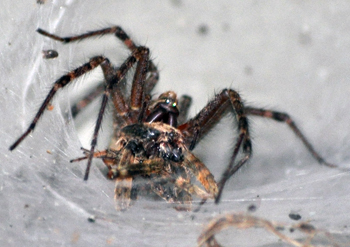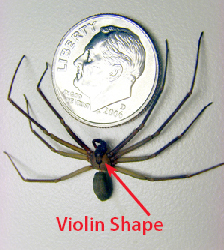Not All Spiders Are Bad

I know I'm going to have a difficult time convincing you of the next point. Spiders can be a good thing. That’s right, you don't have to automatically step on, exterminate, or otherwise kill every spider around your home. And I'll admit it, I actually picked up a spider inside our home last week and took it outside. Perhaps it was a weak moment, or perhaps it was those fluorescent green markings on this jumping spider that intrigued me. Or better yet, perhaps I knew that spiders can eat and control a lot of other undesirable insects outside.
The benefits of spiders
Crickets, ants and millipedes are just a few of the insects spiders can help keep in check. Think of spiders as your personal home protection system for invading insects. I still don't have you convinced, do I? Well consider the comments of one of our K-State entomologist, Bob Bauernfeind, who writes about spiders around homes. Bob confessed that in the eyes of many people, spiders are visualized as “creepy” and “dangerous”. While all spiders produce venom which is used to “still” their prey, bear in mind that:
- spiders are non-aggressive;
- most spiders are small and their tiny fangs too weak to penetrate our toughened skin; and
- their venoms are very mild to humans.
Spiders living outdoors may seek the warmth of our homes. Perhaps wolf spiders are the most commonly recognized species due to their size (some species with a 4-inch leg span) and hairy appearance. Their overall color may vary from brown to grey. They may be flecked with different body patterns. Wolf spiders are hunting spiders that are always on the prowl. But they are timid creatures and do not seek out and attack people.
Spider-proofing your home
You will start seeing more spiders outside and around your home in the fall. The cooler temperatures are driving them closer to cover and your home is pretty good cover. But taking a few steps will help ensure spiders stay outside and do their bug catching job, and allow you to enjoy your home.
You probably already know the routine but take some time to inspect all around your home. Look for any small openings where spiders and other insects can easily make their way inside. It only takes a tiny crack to allow insects an easy way in. A few tubes of caulk will not only seal those openings and keep insects out, but also help with air infiltration. Be sure to check weather strips on windows, entry doors, and garage doors, too.
Brown recluse spiders are poisonous

Now if you’re one of those folks who have brown recluse spiders inside, the tactics change a little bit. Brown recluse spiders are one of the few spiders that are considered poisonous to humans. While you can learn to live with them if you have too, there are more reasons to consider eliminating them. In addition to the barrier method mentioned above, you’ll need to consider a professional pest control operator or some type of self-treatment application.
You are welcome to bring a sample to our Johnson County K-State Extension Office Map to our office, or the Cooperative Extension Service nearest you.
Contact Us